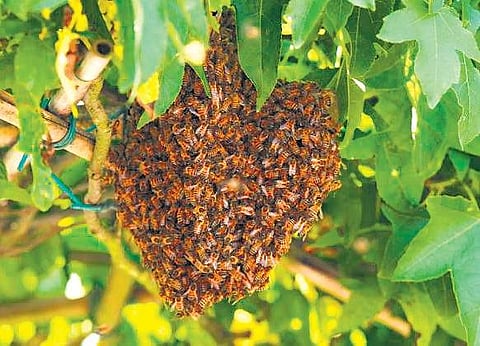

We are losing bees at an alarming rate.
Honeybees, master pollinators of our food crops, are dying. Community Collapse Disorder (CCD) has wiped out millions of bees over the last decade. In California’s Central Valley, where 80 per cent of the world’s almonds are grown, almost 90 per cent of bees have disappeared. Bees are now being imported from Europe to help pollinate the almond crops, and then transported to Florida to service the orange orchards. Nearly two million hives were imported to pollinate the eight lakh acres of almond crops in the US.
Over 34 countries are experiencing a heavy decline in bee populations; in China followed by Mexico, France, Germany, Belgium, Portugal, Turkey, Sweden, Croatia, Brazil, New Zealand, Spain and the Middle East, nearly 45 per cent of the bee colonies and hives have disappeared.
Some entomologists have pointed to a wide range of potential explanations for this CCD: Heavy pesticide use, viruses, GM crops, monoculture crops, mites and even radiation from mobile towers and phones.
Laboratory tests show some bees infected with several pathogens and fungi at the same time. Experts fear that the insects’ immune systems collapse due to malnutrition and viruses. Pesticides and insecticides are another serious concern.
In China’s fruit-bearing Sichuan Province, the apple trees are in full bloom. But instead of the flowers, what is bound to catch your eyes is thousands of farmers, children and women, perched on the trees, carrying chicken feathers and jars of pollen, trying to brush and hand-pollinate the blossoms.
Honey bees in this part of China have been dead for over 20 years. They were wiped out due to overuse of pesticides and loss of bee habitat. Wild flowers and meadows have been removed to make way for intensive industrial agriculture, mono culture crops and commerce.
With the bees no more, the fruit output of the region has fallen drastically by over 50 per cent.
Greece has one of the world’s biggest bee settlements and produces over 14,000 tonnes of honey for export to Europe per year. Sudden death of hordes of bee colonies sets the alarm signals ringing. The honeybees tested positive for Varroa destructor, Nosema ceranae, deformed wing virus, acute paralysis virus along with the presence of multiple pathogens and pesticides.
Disappearance of the bees raises serious concerns for the global community. In Ontario, 37 million bees were found dead after GMO corn was planted at a farm. All fingers pointed to the use of neonicotinoids, the bee-killing insecticide that is banned in Europe but used with GMO seeds.
Farmers in Britain are worried. Many bee-dependent crops in the UK are disappearing. In Serbia, over five million bees died within 48 hours. In Brazil, 10 million died.
The pollinators are dropping dead due to unsustainable human activities such as the use of banned pesticides and monoculture farming that have weakened the bees’ immunity leading to proliferation of Varroa mites and viruses.
Disappearing bees may tip the ecological balance. In our mindless haste for “progress”, we have once again almost wiped out a crucial link of the food chain. It’s no rocket science. The common man has no control over pesticides or banned GMO seeds. Their free availability reeks of conspiracy between the manufacturers and our politicians. Lack of good governance and poor leadership have failed the people of the planet.
In our self-consumed race for power and more, we have trampled over the basic foundations of life. If we are serious about a future, we need to act at individual levels. The earth and we all need butterflies and bees. We need an intact and balanced world for our own survival.